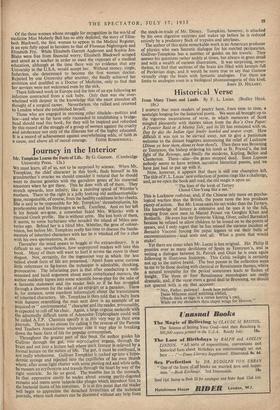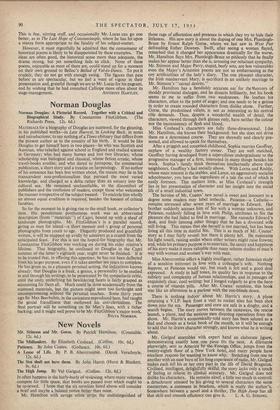Historical Verse
I SUSPECT that most readers of poetry have, from time to time, a nostalgic longing for the historical poem. We were all brought up to the vigorous incantations of verse, in which memories of Scott mingled pleasantly with themes taken from the Boy's Own Paper: A Frontier Raid or A Mutiny Tale, and its lilt has remained with us. Day by day the Indian tiger louder howled and nearer crept. How difficult it was not to be carried away, not to give a passionate welcome to the distant bagpipes announcing the relief of Lucknow (Dinna ye hear them, dinnu ye hear them?). Then there was Browning or Tennyson, the bishop ordering his tomb at St. Praxed's, the last fight of the Revenge, and finally the moderns, Kipling, Belloc and Chesterton. There—alas—the genre stopped dead. Since Lepanto nobody seems to have written narrative historical poems, and we have just had to put up with it.
Now, however, it appears that there is still one champion left. The title of F. L. Lucas' new collection of poems rings like a challenge, and, as we open the book and read, the old magic is upon us: " The lines of the lords of Tartary Closed Chin-Yang like a net."
This is Lucknow redivivus, and, if the Chinese rely more on psycho- logical warfare than the British, the poem none the less produces plenty of action. But Mr. Lucas casts his net wider than the Tartars. His knowledge of history is extensive and he uses it to the full, ranging from cave men to Marcel Proust via Genghiz Khan and Botticelli. He even has my favourite Viking, Olver, called Barnakarl because he refused to allow children to be tossed on to the points of spears, and I only regret that he has missed the curious incident of Bomb?) Visconti forcing the papal legates to eat their bulls of excommunication—lead seals and all. What a poem that would make Yet there are times when Mr. Lucas is less original. His Philip II presides over as many devildoms of Spain as Tennyson's, and in writing a dialogue between St. Patrick and Oisin he is once again following in illustrious footsteps. This Celtic twilight is certainly not up to the native brand. The best poems in the collection seem to me to be those dealing with classical or Renaissance themes, where a natural sympathy for the period sometimes leads to flashes of insight. The three or four Renaissance monologues are really dramatic, and, if the verse owes a good deal to Browning, we should not quarrel with it on that account:
" Nay, Father, patience! Look how patiently These Milanese stand watching edified, (Heads thick as eggs in.a rotten herring's roe),
While on my shoulders thou clapst wings for Heaven." This is fine, stirring stuff, and occasionally Mr. Lucas can go one better, as in The Last Hope of Constantinople, where he has hit upon a stanza form appropriate to the fatality of his subject-matter.
However, it must regretfully be admitted that the connoisseur of historical poems is likely to be disappointed by these examples. The ideas are often good, the historical sense more than adequate, the drama strong, but yet something fails to click. None of these poems, enjoyable as most of them are, could stand up for a moment on their own ground to Belloc's Ballad of Val-es-Dunes. To put it crudely, they do not go with enough swing. The figures that pass before us are spectacular, but we feel a want of vigour in their presentation and, grateful though we are to Mr. Lucas for his pageant, end by wishing that he had consulted Calliope more often about its



























 Previous page
Previous page